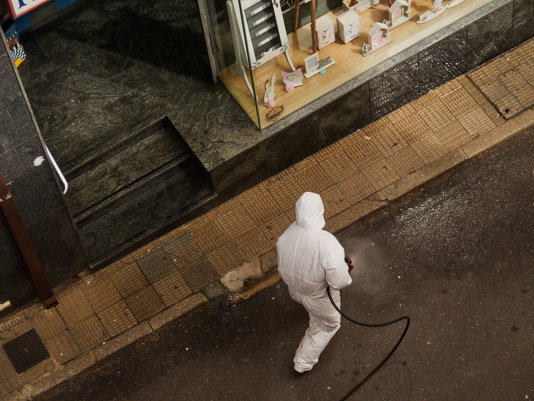- About
- Topics
- Picks
- Audio
- Story
- In-Depth
- Opinion
- News
- Donate
- Signup for our newsletterOur Editors' Best Picks.Send
Read, Debate: Engage.
The sages taught: “When plague is in the town - gather your feet,” (Bava Kamma 60b), i.e limit the time you spend out of the house. The wise men of the Talmud understood 1,600 years ago what took governments in the third decade of the 21st century too long to comprehend - when a new epidemic rages, people must stay indoors.
However, unlike the ancient world’s socio-economic state of affairs, the progress, welfare, and luxury of our times make it all the more difficult for us to contend with the harshness of the situation. The fact that things that up until two weeks ago seemed completely natural to us (going to work or on vacation. sitting at a restaurant, meeting up with friends, leaving the house, shaking hands) are now virtually impossible to do will leave lasting social, financial, and cultural impacts long after the pandemic will end.
The coronavirus and respiratory disease it causes are neither boils nor leprosy. This isn’t an apocalyptic Netflix movie. The virus does not instigate a particularly visible disease; those infected don’t instantly turn into zombies. In many cases it results in no more than a cough and a runny nose. But it is precisely this ‘invisibility’ that makes the virus lethal and turns it into a real threat to the world’s already precarious social balance.
Many people, from the laities in the streets to the presidents of the United States and Brazil, brush off the issue as a ‘simple cold’, and thus put themselves and those around them in danger. The reckless statements by Donald Trump and Jair Bolsonaro a couple of weeks ago about the coronavirus could result in the deaths of tens or hundreds of thousands of people. Countries that will not take significant steps to prevent the spread of the disease would not only place an impossible burden on the health systems (the vast majority of which are unprepared to handle the outbreak), but also lead to enormous death tolls.
But I, too, carelessly shrugged off the issue at first as an overblown hysteria. That was until I got sick.
“I am a sick man… I am a spiteful man,” wrote Dostoyevsky in Notes from the Underground. To paraphrase him - I am a sick man, I am an irresponsible man. I came down with what I thought had been an unpleasant cold back on 5 March. I went to the doctor the following morning (back then you could still see a doctor) because I worried I was developing strep throat. On that day, the number of people known to be infected with coronavirus in the U.K. was 580 and the death toll was 11. COVID-19 was largely thought of as a problem concerning China and Italy - not a threat that could impact my petite-bourgeoisie neighborhood in London. Neither me nor my doctor thought I could have contracted the virus, seeing as I hadn’t come in contact with anyone who had returned from the ‘infected’ countries.
My doctor told me to rest at home, drink tea, and take cold medication. Several days later I thought I had recovered, but then the disease hit again with greater force. I then started feeling pressure in my chest and shortness of breath. I realised this was not a flu. Ever since, I have been in self-isolation and taking medication. My condition is regarded as mild. Who knows how many people I had infected.
Meanwhile, the number of confirmed cases in the U.K. climbed to nearly 10,000 with close to 500 deaths. All that in a matter of less than three weeks.
The rates of infections are rising across the world. The recent statistics released by the World Health Organisation are terrifying: it has been 67 days since the first case had been reported to reach 100,000 cases, 11 days for second 100,000 and just four days for the third 100,000 cases.
As of the time when this article was written, the number of confirmed cases worldwide is close to 400,000 and the death toll hovers over 17,000, but rises sharply every day.
The high infection rates cause yet another danger associated with the pandemic: the virus mutates rapidly, and already in February two different strains were discovered. This makes it difficult to develop a vaccine or medication to combat the virus.
The fact that we’re dealing with a new and unfamiliar disease also makes it hard to examine the statistics. Why is the death toll in Italy so much higher than in its neighboring countries, such as Germany, where infection rates are also very high?
The gods of the pandemic have solutions. And here, we have been told that the Olympic games will be postponed. They were only postponed twice before: during the first and second world wars. This is World War III, and it requires sacrifices.
Given the circumstances, we don’t have a choice but to heed yet another Jewish command: take careful heed to yourself (Deuteronomy 4:15).
Image: Manuel via Flickr
